De Amerikaanse schrijver Richard Powers werd geboren op 18 juni 1957 in Evanston, Illinois. Zie ook alle tags voor Richard Powers op dit blog.
Uit: Orfeo
“Lights blaze from an American Craftsman home in a demure neighborhood, late on a spring evening, in the tenth year of the altered world. Shadows dance against the curtains: a man working late, as he has every night that winter, in front of shelves filled with glassware. He’s clad in mufti, protective goggles, and latex hospital gloves, and his Giacometti body hunches forward as if in prayer. A gray but still-thick Beatles mop hangs in his eyes.
He studies a book on the gear-cluttered workbench. In one hand-a single-channel pipette, raked like a dagger. From a tiny refrigerated vial, he sucks up no more colorless liquid than a hoverfly might take from a sprig of bee balm. This pellet goes into a tube no bigger than a mouse’s muzzle, a dollop so small he can’t be sure it’s really there. His gloved hands shake as he shoots the used pipette tip into the trash.
More liquids go from the beakers into the dollhouse cocktail: oligo primers to start the magic; heat-stabilized catalyzing polymerase; nucleotides that fall in line like enlisted men for a five a.m. reveille, a thousand bonds per minute. The man follows the printed recipe like an amateur cook.
The brew goes into the thermal cycler for twenty-five rounds of roller-coaster flux, swinging between near-boiling and tepid. For two hours, DNA melts and anneals, snatches up free-floating nucleotides, and doubles each time through the loop. Twenty-five doublings turn a few hundred strands into more copies than there are people on Earth.
Outside, budding trees submit to the whims of a light wind. A wave of holdout nightjars skim the air for bugs. The do-it-yourself genetic engineer removes a colony of bacteria from his incubator and sets it under the laminar flow hood. He stirs the flattened culture flask and dispenses the loosened cells into a twenty-four-well sample plate. This plate goes under a microscope, at 400x. The man puts his eye up to the lens and sees the real world.“
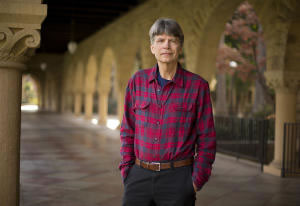
De Franse schrijver Raymond Radiguet werd geboren op 18 juni 1903 in Saint-Maur-des-Fossés. Zie ook alle tags voor Raymond Radiguet op dit blog.
Uit: The Devil in the Flesh (Vertaald door Christopher Moncrieff)
“It was now the beginning of March. Spring was early. On the days when Marthe did not come with me into Paris she was waiting for me in the evening on my return from art school. Naked beneath her dressing-gown, she lay in front of the fire. Olive-wood from her parents-in-law’s estate burned in the hearth. She had asked them to renew her supply. I do not know what held me back. Perhaps it was simply the fear of doing something one has never done before. I was reminded of Daphnis. But in this case it was Chloe who had been given one or two lessons and Daphnis did not dare to ask her to teach him. Besides, I tended to regard Marthe as a virgin, given over during the first fortnight of her marriage into the arms of an unknown man, who had taken her several times by force.

Alone in my bed at night I spoke Marthe’s name, furious with myself – I who regarded myself as a man – for not being man enough to make her my mistress. Each time I went to see her I swore I would not leave until she was.
On my sixteenth birthday, In March 1918, she gave me a dressing-gown like her own. She hoped I would not be angry but she wanted to see me try it on there. I was so happy that I nearly made a pun; something I never did. My toga praetexta, my pretext! For I realised that what had inhibited me was a sense of the ridiculous, of feeling dressed when she was not. At first I was going to put the dressing gown on that same day. Then, blushing, I saw what a reproach this present implied”.
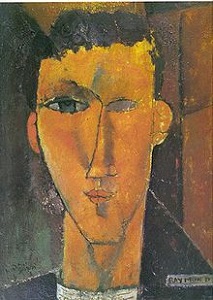
Portret door Modigliani, 1915
De Engelse dichter Geoffrey Hill werd geboren op 18 juni 1932 in Bromsgrove, Worcestershire. Zie ook alle tags voor Geoffrey Hill op dit blog.
Tenebrae
He was so tired that he was scarcely able to hear a note of the songs: he felt imprisoned in a cold region where his brain was numb and his spirit was isolated.
1
Requite this angel whose
flushed and thirsting face
stoops to the sacrifice
out of which it arose.
This is the lord Eros
of grief who pities
no one; it is
Lazarus with his sores.
2
And you, who with your soft but searching voice
drew me out of the sleep where I was lost,
who held me near your heart that I might rest
confiding in the darkness of your choice:
possessed by you I chose to have no choice,
fulfilled in you I sought no further quest.
You keep me, now, in dread that quenches trust,
in desolation where my sins rejoice.
As I am passionate so you with pain
turn my desire; as you seem passionless
so I recoil from all that I would gain,
wounding myself upon forgetfulness,
false ecstasies, which you in truth sustain
as you sustain each item of your cross.
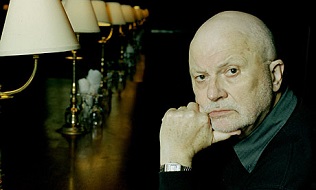
De Nederlandse schrijver en dichter Bert Schierbeek werd geboren op 18 juni 1918 in Glanerbrug in Twente. Zie ook alle tags voor Bert Schierbeek op dit blog.
Kijk
kijk,
ik weet het niet
ik was nog nooit dood
maar als je nou dood bent
wat zie je dan
wat zie jij nu wat ik niet zie
Want als de ogen zich sluiten
en het zicht naar binnen keert
waar ben ik dan
en jij?
en wij?
kijk,
als ik die kurketrekker pak
die zweedse van blank berken
en een fles rooie ontkurk
dan zie ik jou voor me
zoals je dat deed
je ogen
je hand
het glas
kijk,
dat wel
en de zon
een rooie bal over de heuvels
en de meeuw
een vliegende vlek in de zon
net als jij
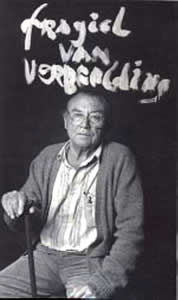
Cover
De Duitse dichteres Karin Fellner werd geboren op 18 juni 1970 in München. Zie ook alle tags voor Karin Fellner op dit blog.
ab bricht der sommer die zelte
ab bricht der sommer die zelte
rundum renovation
mit hämmern und sägen kreischen
die vollen backen aaa
mode moschee da köcheln
zungen kanacken weg
anderes wird im kessel
konserviert im weck
glas zwetschgen geballt und
kaum verhallt der verhaltne
ruf nach einem der
mia schuftn songs doch söiba
aba da kurde do kriagt
a neies hüftglenk gschenkt
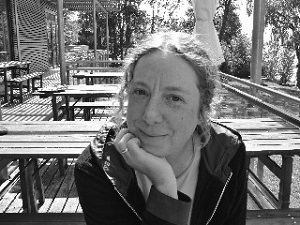
De Vlaamse schrijver Aster Berkhof (eig. Louis van den Bergh werd geboren in Rijkevorsel op 18 juni 1920. Zie ook alle tags voor Aster Berkhof op dit blog.
Uit: De zomer en ik
“Hebt u onlangs nog deel uitgemaakt van een ‘luie hoek’? U weet toch wat dat is. Het dient zomer te zijn, natuurlijk. Ook avond. Een warme, zachte, geurige zomeravond. Een stil plekje daarin, een stadspleintje met bomen, dehoek van een straat, een meerpaaltje op de vaartdijk, dewarme muur van een bakkerij, een berm waar landwegeltjes elkaar kruisen. Daar een groepje mensen die tijdensde dag goed gewerkt hebben, tevreden zijn over zich zelf en zonder enig doel of plan bij elkaar gekomen zijn.
Sommigen staan. Sommigen zitten neergehurkt. En ze keuvelen. Uren lang, tot ze elkaar in het donker nog maar nauwelijks kunnen zien.
Deze vreedzame avondlijke keuvelpartijtjes op de ‘luie hoeken’ gaan nu verloren. Ze zijn al verloren gegaan. Men heeft geen tijd meer. Men heeft nooit meer gedaan. Er moet geld zijn voor zoveel dingen. Dat huis, die auto, die tweede auto, die zomerreis, die winterreis. Men moet ook naar de televisie kijken. Men rijdt per auto naar de kruidenier. Neen, men rijdt niet meer naar de kruidenier.
Men doet al zijn boodschappen in één keer in het winkelcentrum. Men ontmoet elkaar niet meer. Men kent elkaar niet meer. We hebben partijtjes waar in de fauteuils naast ons onbekenden zitten. We hebben ook zo’n 40 jaar maaltijden. We geven daar vertoningen. Dit vreemde verschijnsel vond plaats, dat men ons, arbeidende mensen, genoeg vrije tijd gaf om die nuttig in arbeidstijd te kunnen omzetten en dat we dat deden en daardoor de gejaagdheid in ons verhoogden.”
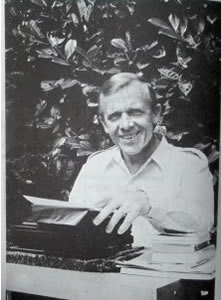
Zie voor nog meer schrijvers van de 18e juni ook mijn blog van 18 juni 2012 en eveneens mijn blog van 18 juni 2011 deel 2.
